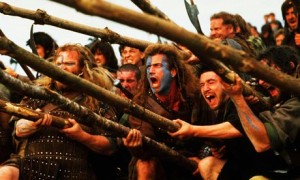

It may be that evolution has molded men to respond with aggression towards anyone they perceive to be an outsider, according to a new study published in the Philosophical Transactions of the Royal Society B. Lead researcher Mark van Vugt conducted a review of prior studies in an attempt to support or discredit what has been called the “male warrior hypothesis.”
Van Vugt concluded that there was evidence for the existence of an instinct for violence against outsiders. This instinct was very useful during humanity’s hunter-gatherer period, in part because it helped males gain status and improved their access to potential mates. However, it is not as adaptive in today’s world, leading to conflicts that arise over what appear to observers to be trifling issues. These conflicts range from disputes between supporters of rival sports teams to full-scale wars over territorial boundaries.
According to Van Vugt, the available evidence suggests that hunter-gatherers frequently fought over resources and took women as the spoils of victory. Men who were more aggressive killed less aggressive men and produced children with their widows, effectively removing from the gene pool men who lacked the genetic predisposition towards belligerence.
This trend continued into more recent history, with famous examples including Ghengis Khan, who is believed to have 16 million direct male descendants due to his combined military and sexual conquests, and the Vikings, whose genes made their way to areas as diverse as the Scottish Western Isles and North America. Indeed, a 2008 study conducted by researchers in California showed that genes heavily influence traits like aggression.
Women, on the other hand, may have been more likely to survive the upheaval of conquest and enemy occupation if they possessed what researchers call a tendency to “tend and befriend” outsiders. Women who were more likely to resolve conflicts peacefully even at great personal cost may have been more likely to survive and to pass their pacifistic tendencies on to their daughters.
Van Vugt asserts that men in every culture throughout history are more apt than women to become violent upon encountering outsiders. He cites evidence that men identify more strongly with their groups and that pulling together to defeat a common enemy helps men to develop stronger relationships with each other.
The tendency to respond with aggression towards rival groups probably served to protect the group and make it less vulnerable to attack. Taking the fight away from the women and infants and into the surrounding area before a potential enemy has an opportunity to behave aggressively is an age-old defense tactic, after all. However, in today’s world of professional armies, when most men are no longer the only thing standing between their pregnant wives and infants and invading marauders, this trait often results in unnecessary violence.
“A solution to conflict, which is an all too common problem in societies today, remains elusive. One reason for this might be the difficulty we have in changing our mindset, which has evolved over thousands of years,” wrote Van Vugt. “Our review of the academic literature suggests that the human mind is shaped in a way that tends to perpetuate conflict with outsiders.”
Leave a Reply